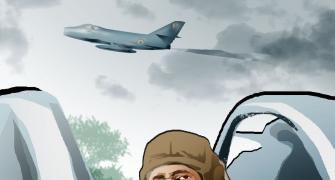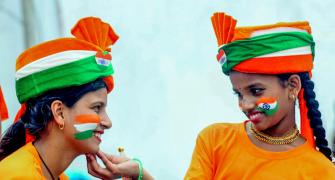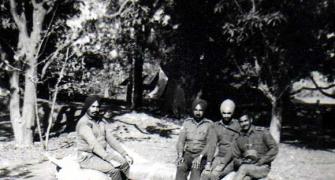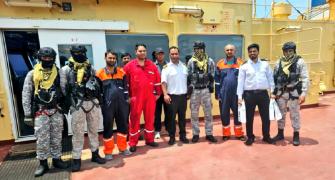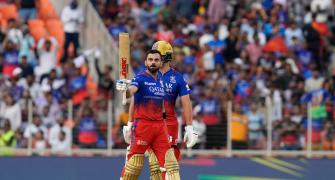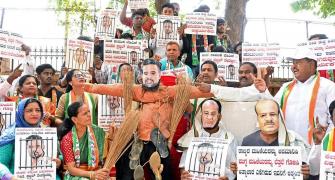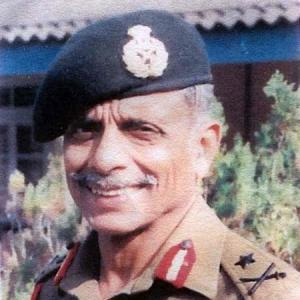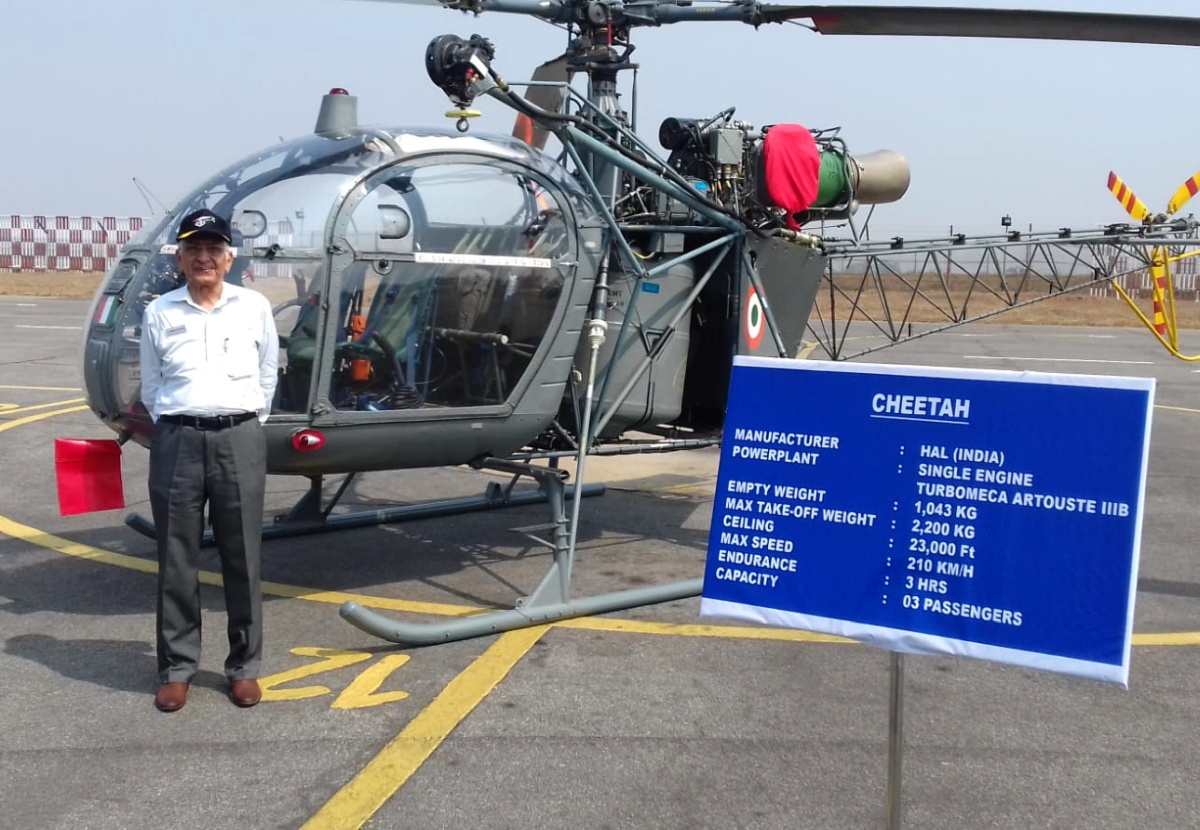'The next war will be fought by China-Pakistan against India and we have to fully be prepared. We must read the writing on the wall.'
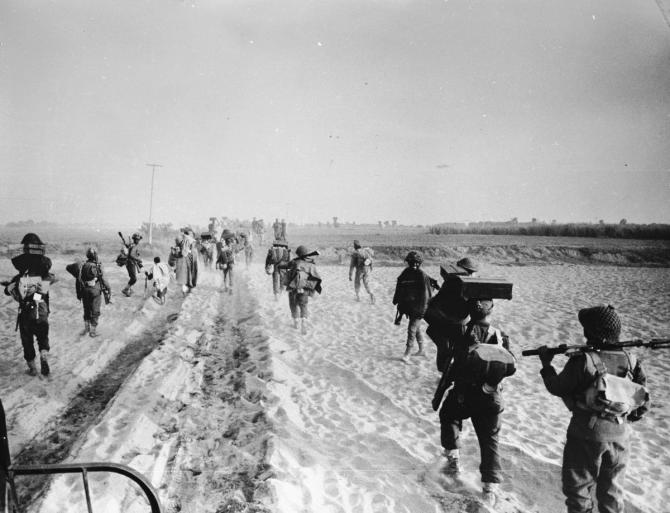
Major General Ian Cardozo had just saved a boy from drowning. As he swam ashore and emerged from the water, the crowd at the beach was surprised to see that he had only one leg.
The war disabled officer had taken off his wooden leg to save the boy from being swept away by a strong tide when many other able swimmers were daunted by the rough sea.
"Those of us who are disabled have to continuously prove that we are as good, sometimes even better than the rest -- and that has been the credo of my life," says the decorated officer who lost his leg in the 1971 War with Pakistan.
Major General Cardozo fought in the 1962 War with China, the 1965 and 1971 Wars with Pakistan. A young Major during the 1971 War, he stepped on a mine which blew his leg off.
He learnt to walk, climb, swim again and bravely overcame his disability to become the first war disabled officer to command an infantry battalion and a division.
He retired as chief of staff of a corps in the North East and extensively worked for the rehabilitation of war wounded soldiers.
A military historian, he has written a highly acclaimed autobiography Cartoos Sahib and 1971: Stories Of Grit And Glory From The Indo-Pak War. His just published book Beyond Fear is a collection of true stories drawn from life in the armed forces.
The stories are an inspirational and moving account of the men and women in the armed forces and their families.
The decorated officer and military legend spoke to Rediff.com's Archana Masih in a must-read two-part phone interview.
One of the stories in your book that Rediff posted was about Squadron Leader A B Devayya who was killed in action after a heroic dogfight the 1965 War and awarded a Mahavir Chakra 23 years later.
This is the only story about the Indian Air Force in your book, why did you choose to tell this story?
Squadron Leader 'Tubby' Devayya attacked a Pakistan air force Starfighter aircraft which was superior in avionics, guns, armament and equipment compared to his Mystere.
Devayya was at the tail end of the IAF's fighter group. He was running short of fuel and yet turned around to engage with the enemy.
His aircraft was shot and damaged badly, but he followed the Starfighter with persistence and managed to destroy it.
It was the only Starfighter destroyed in aerial combat in the 1965 War.
Squadron Leader Devayya was killed in action and his conduct in the war showed his love for the country, squadron and the Air Force.
He kept his honour intact and did not break away from pursuing the Starfighter to fight another day, but decided to engage with the enemy. It tells us about his self-sacrifice because he knew he'd never come back which made the story what it is.
These are the great qualities of Indian soldiers, sailors and airmen.
The intriguing part of this story was that his fellow pilots did not know what happened. His Commanding Officer O P Taneja was waiting for him to return, but he never came back and nobody knew whatever happened. He was listed as 'missing in action'.
What Tubby Devayya did only came out in John Fricker's Battle for Pakistan: The Air War of 1965 (published in Pakistan in 1979), which narrated the story of this air battle.
It was then that Wing Commander O P Taneja pieced together what actually happened. It took him eight years to fight the system to ensure that his pilot was given the honour that was due.
Tubby Devayya was given the Mahavir Chakra 23 years after the incident which is a record.
It is also tribute to Wing Commander Taneja's persistent efforts.
Absolutely! He never gave up fighting for his pilot. It is also a credit to the IAF that it accepted the wing commander's recommendation.
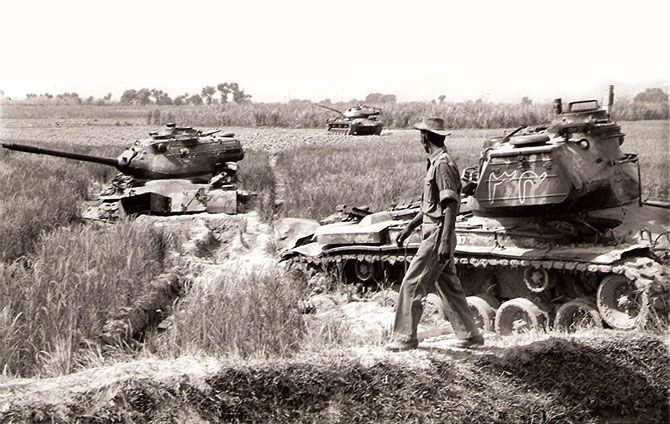
Your stories also tell us that soldiering is not only about guns and weapons, but also about winning hearts and minds of insurgents and local populations.
Since you have been chief of staff of a corps in the North East, what are some of the lessons that can be employed in Manipur today to bring peace?
The armed forces are loved by everybody in this country because they are even handed and just. The army can only go to assist civil authority when the government asks for them.
In this case, the government did not call the army.
Firstly, when the army has to maintain curfew in a city or a town, it makes sure that no one is out during that time.
When Indira Gandhi was assassinated, my battalion was posted in Delhi. The lieutenant governor was out in his car and was stopped by a second lieutenant who asked why was he roaming around when there were shoot at sight orders. The lieutenant governor said, 'I issue the orders', and you know what the second lieutenant did?
He said, 'Sir, you should be the first person to obey your own orders.'
The lieutenant governor apologised and said he would go back. The officer said, 'No, sir, if you wish to move around I will give you an escort otherwise you risk being shot at'.
This shows that when orders are issued, the army will make sure they are implemented. The army can stabilise the situation and maintain law and order by ensuring that people don't move out.
The role of the army is to secure the country against external aggression and internal dissension, but it cannot interfere or intrude without the government asking them to aid civil authority.
One of the stories in the book is about how Captain Pillay won hearts and minds in Manipur during the conflict between Nagas and Kukis in 1994.
In Captain Courageous [about Captain Leena, the first lady doctor to serve in a forward area and awarded the medal for gallantry], the corps commander tells the battalion that they are going into an area of their own people and they would have to win the hearts and minds through their action, attitude, behaviour and conduct.

Captain Leena's is such an inspiring story. You played a pivotal role in ensuring that she was not denied the opportunity to serve in the frontline just because she was a woman.
Today women officers are picking up positions as commanding officers -- what further changes do you expect for women in the armed forces?
As the colonel of the regiment I was clear that she was doing her duty as a doctor in an area which was terrorist-infested because she was part of a combat arm.
The Indian Army is the best army in the world without any iota of doubt because our training, heritage, regimental spirit is what makes us fight and give up our lives in the line of fire.
When former army chief, General (T P) Raina went to the USA after the Vietnam War, the chief of general staff of the US army asked him what is it that makes the Indian soldier such a good fighter.
General Raina told him it was the Indian Army's regimental spirit.
I feel this regimental spirit is likely to be impacted by the Agniveer programme. It is a copy of the West where soldiers are taken in for a short time.
The issue broadly lies in the fact that we Indians ignore our culture, traditions, customs, history, music, dance and ape the West.
In China, soldiers are recruited as conscripts for two years. The American or Chinese soldiers are not a patch on our Indian soldiers.
If soldiers serve only for four years and do not get a pension, will they be loyal to the regiment?
The next war will be fought by China-Pakistan against India and we have to fully be prepared. We must read the writing on the wall.
You mention the regimental spirit while your own regiment -= the Gorkha Rifles -- has stopped recruiting soldiers from Nepal for two years. How is this going to impact the regiment?
Nepal has been driven into the arms of China and we should be very careful. The Gorkhas are very good fighters and will start joining other armies of the world.

Having overcome disability yourself, what are some of the biggest difficulties confronted by soldiers when they return to service?
When I was recovering in hospital, there was no hope. There were only two disabled officers since World War II who had reached brigadier rank. I resolved to do whatever I could -- physically and psychological -- to change the system. I was able to prove that I could walk, run, climb and go back to my troops.
I loved serving in the army and loved my troops. If you do what you love and love what you do, then your disability doesn't matter. You have got to prove that you're as good or better than others.
Thirdly, never be afraid. There will be lots of challenges and you have to convert them into opportunities.
Lastly, never give up.
I believed and I carried on. I continued to focus on running and fitness.
Those of us who are disabled have to continue to prove that we are as good as the rest and that has been the credo of my life.
- Part 2 of the Interview: 'When the Pakistanis surrendered...'
Feature Presentation: Aslam Hunani/Rediff.com

